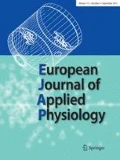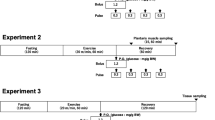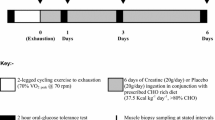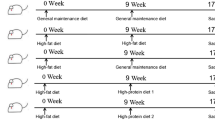Summary
The effect of a high-carbohydrate (C) diet intake on muscle glycogen repletion during the early period of recovery from exercise was studied in rats previously fed a high-fat (F) diet. In experiment 1, 3 weekold male and in experiment 2, 3 week-old female rats were used. Rats were fed either the F or the C diet for 2–10 weeks ad libitum and then were meal-fed regularly twice a day for 25 days in experiment 1, or for 5 weeks in experiment 2. During the period of regular feeding, half of the rats in both dietary groups continued to eat as before (F-F and C-C) but the other half of the rats were switched to the counterpart diets (F-C and C-F) in experiment 1. In experiment 2, half of the F-F group were switched to the C diet (F-C) for 3, 7, and 14 days after the period of regular feeding. Pre-exercise glycogen content in soleus, red gastrocnemius, and heart muscles and liver was higher in rats fed the C diet (C-C and F-C) than in rats fed the F diet (F-F and C-F) in experiment 1. Glycogen repletion in red muscle 2 h after the ingestion of a glucose and citrate (3.0 and 0.5 g, respectively, per kg body mass) drink was also higher in the former than in the latter. There was a positive relationship in skeletal muscles between pre-exercise glycogen content and the rate of glycogen repletion. Compared with the rats maintained on the F diet (F-F), the rats switched to the C diet (F-C) for 3 and 7 days showed faster glycogen repletion in soleus and/or red gastrocnemius muscles in experiment 2. These results indicated that the poor capacity of restoration of skeletal muscle glycogen in rats previously fed the F diet was improved by the short-term dietary switch to the C diet.
Similar content being viewed by others
References
Armstrong RB (1988) Muscle fiber recruitment patterns and their metabolic correlates. In: Horton ES, Terjung RL (eds) Exercise, nutrition, and energy metabolism. Macmillan, New York, pp 9–24
Armstrong RB, Laughlin MH (1983) Is rat soleus muscle recruited during swimming? Brain Res 258:173–176
Åstrand PO (1967) Diet and athletic performance. Fed Proc 26:1772–1777
Baldwin KM, Winder WW, Terjung RL, Holloszy JO (1973) Glycolytic enzymes in different types of skeletal muscle: adaptation to exercise. Am J Physiol 225:962–966
Bergström J, Hermansen L, Hultman E, Saltin B (1967) Diet, muscle glycogen and physical performance. Acta Physiol Scand 71:140–150
Bergström J, Hultman E, Jorfeldt L, Pernow B, Wahren J (1969) Effect of nicotinic acid on physical working capacity and on metabolism of muscle glycogen in man. J Appl Physiol 26:170–176
Björntorp P, Sjöström L (1978) Carbohydrate storage in man: speculations and some quantitative considerations. Metabolism 27:1853–1865
Blom PCS, Costill DL, Vollestad NK (1987) Exhaustive running: inappropriate as a stimulus of muscle glycogen super-compensation. Med Sci Sports Exerc 19:398–403
Coulee RK, Hickson RC, Winder WW, Hagberg JM, Holloszy JO (1978) Regulation of glycogen resynthesis in muscles of rats following exercise. Am J Physiol [Regulatory Integrative Comp Physiol] 235:R145-R150
Costill DL, Coyle E, Dalsky G, Evans W, Fink W, Hoopes D (1977) Effects of elevated plasma FFA and insulin on muscle glycogen usage during exercise. J Appl Physiol Respir Environ Exerc Physiol 43:695–699
Costill DL, Pascoe DD, Fink WJ, Robergs RA, Barr SI, Pearson D (1990) Impaired muscle glycogen resynthesis after eccentric exercise. J Appl Physiol 69:46–50
Fell RD, Terblanche SE, Ivy JL, Young JC, Holloszy JO (1982) Effect of muscle glycogen content on glucose uptake following exercise. J Appl Physiol Respir Environ Exerc Physiol 52:434–437
Gruner JA, Altman J (1980) Swimming in the rat: analysis of locomotor performance in comparison to stepping. Exp Brain Res 40:374–382
Hargreaves M, Kiens B, Richter EA (1991) Effect of increased plasma free fatty acid concentrations on muscle metabolism in exercising men. J Appl Physiol 70:194–201
Hickson RC, Rennie MJ, Coulee RK, Winder WW, Holloszy JO (1977) Effects of increased plasma fatty acids on glycogen utilization and endurance. J Appl Physiol Respir Environ Exerc Physiol 43:829–833
Jansson E, Kaijser L (1982) Effect of diet on muscle glycogen and blood glucose utilization during a short-term exercise in man. Acta Physiol Scand 115:341–347
Lo S, Russel JC, Taylor AW (1970) Determination of glycogen in small tissues. J Appl Physiol 28:234–236
Maehlum S, Felig P, Wahren J (1978) Splanchnic glucose and muscle glycogen metabolism after glucose during post exercise recovery. Am J Physiol [Endocrinol Metab Gastrointest Physiol] 235:E255-E260
Miller WC, Bryce GR, Conlee RK (1984) Adaptation to a high-fat diet that increases exercise endurance in male rats. J Appl Physiol Respir Environ Exerc Physiol 56:78–83
Neely JR, Morgan HE (1974) Relationship between carbohydrate and lipid metabolism and the energy balance of heart muscle. Ann Rev Physiol 36:413–459
O'Reilly KP, Warhol MJ, Fielding RA, Frontera WR, Meredith CN, Evans WJ (1987) Eccentric exercise-induced muscle damage impairs muscle glycogen repletion. J Appl Physiol 63:252–256
Phinney SD, Bistrian BR, Evans WJ, Gervino E, Blackburn GL (1983) The human metabolic response to chronic ketosis without caloric restriction: preservation of submaximal exercise capability with reduced carbohydrate oxidation. Metabolism 32:769–776
Reed MJ, Brozinick JT Jr, Lee MC, Ivy JL (1989) Muscle glycogen storage postexercise: effect of mode of carbohydrate administration. J Appl Physiol 66:720–726
Rennie MJ, Winder WW, Holloszy JO (1976) A sparing effect of increased plasma fatty acids on muscle and liver glycogen content in the exercising rat. Biochem J 156:647–655
Saitoh S, Suzuki M (1986) Nutritional design for repletion of liver and muscle glycogen during endurance exercise without inhibiting lipolysis. J Nutr Sci Vitaminol (Tokyo) 32:343–353
Saitoh S, Yoshitake Y, Suzuki M (1983) Enhanced glycogen repletion in liver and skeletal muscle with citrate orally fed after exhaustive treadmill running and swimming. J Nutr Sci Vitaminol (Tokyo) 29:45–52
Saitoh S, Shimomura Y, Tasaki Y, Suzuki M (1992) Effect of short-term exercise training on muscle glycogen in resting conditions in rats fed a high fat diet. Eur J Appl Physiol 64:62–67
Satabin P, Bois-Joyeux B, Chanez M, Guezennec CY, Peret J (1989) Post-exercise glycogen resynthesis in trained high-protein or high-fat-fed rats after glucose feeding. Eur J Appl Physiol 58:591–595
Shimomura Y, Suzuki T, Saitoh S, Tasaki Y, Harris RA, Suzuki M (1990) Activation of branched-chain a-ketoacid dehydrogenase complex by exercise: effect of high-fat diet intake. J Appl Physiol 68:161–165
Simi B, Sempore B, Mayet M-H, Favier RJ (1991) Additive effects of training and high-fat diet on energy metabolism during exercise. J Appl Physiol 71:197–203
Suzuki M, Saitoh S, Yashiro M, Hariu J (1984) Dietary effects on liver and muscle glycogen repletion in exhaustively exercised rats: energy composition and type of complex carbohydrates. J Nutr Sci Vitaminol (Tokyo) 30:453–466
Terjung RL, Baldwin KM, Winder WW, Holloszy JO (1974) Glycogen repletion in different types of muscle and liver after exhausting exercise. Am J Physiol 226:1387–1392
Author information
Authors and Affiliations
Rights and permissions
About this article
Cite this article
Saitoh, S., Shimomura, Y. & Suzuki, M. Effect of a high-carbohydrate diet intake on muscle glycogen repletion after exercise in rats previously fed a high-fat diet. Europ. J. Appl. Physiol. 66, 127–133 (1993). https://doi.org/10.1007/BF01427053
Accepted:
Issue Date:
DOI: https://doi.org/10.1007/BF01427053




